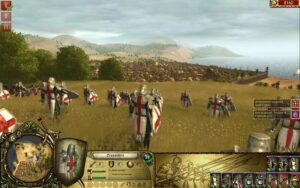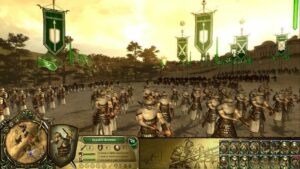Grand strategy games are not often talked about. You have probably heard of real-time strategy games or turn-based strategy games, but grand ones, well, that might be a new term. In reality, grand strategy games just focus on the grand scheme of things, the future, a war, not just a single battle, which is typically the case with RTS games. Turn-based games can be more story oriented, but they typically never scale as well as grand strategy games.
There are plenty of such games, but today, we want to take a closer look at the Crusader Kings franchise, a series of games that appear to be simple and easy to play, but are harder than they look. Here is more about Crusader Kings.
The First Crusader Kings

In 2004, Paradox Interactive, already known for their grand strategy games such as Hearts of Iron and Europa Universalis, built a new game with Johan Andersson in the lead. The game was called Crusader Kings and was a grand strategy game set in the medieval period. It was specifically set in the period prior to the Battle of Hastings, during the time of William the Conqueror in 1066, and until the fall of Constantinople, in 1452.
The game is a grand strategy game, meaning that the player focuses on the long-term and not just through one ruler, but an entire dynasty. Rulers have traits and can do anything from punishing people to waging holy wars.
The Second Crusader Kings
Following the first game and its success, there was an expansion called Deus Vult released in 2007. It had some crucial updates to the game. However, it was not enough. In 2012, the second Crusader Kings title was released, again led by Andersson.
The second game is much like the first one, in the sense that it lasts from 1066 up until 1452, however, the game has many more historical figures, war heroes and conquerors, which you can take and play through their lives, forging your own dynasty along the way.
The second game was also well received, by both the press and the people, meaning that it managed to do many great things. Unlike the first game, the second had 15 expansions and mods. Whether official or unofficial, the support for the game was outstanding, from both the developers and the community.
The Third Crusader Kings

Following the success of the two games, a third had to be eventually released. The third game was the first not to be led by Andersson, but instead Henrik Fahraeus, who stated that the second game’s engine was in patches and barely holding things together, which is why Crusader Kings III used a new engine, a much better one.
Basically, compared to the previous games in the series, Crusader Kings III does everything better, from the graphics to the details surrounding the gameplay. The leaders are much more complex and are now in 3D and the leader-people relationship is much deeper.
Expansions and the Future
Already, the third version of the game has three expansions, with an upcoming flavor pack. The game is looking like the best one in the series and judging by the reviews, it is almost safe to say so.
Crusader Kings is a great grand strategy series of games. Any of the games in the series are great, but the third one is currently the best, which is not often the case with sequels.


